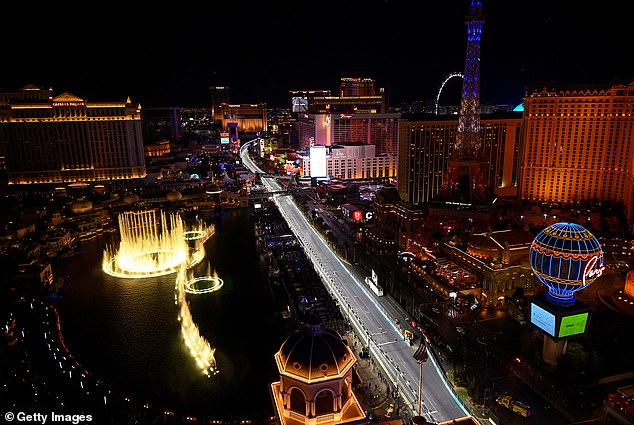F1 CONFIDENTIAL: The miracle drug widely used in the paddock revealed: ‘If it doesn’t work, take more’

There were many tired faces at the Las Vegas Grand Prix. And a week later they are back here in Qatar. These are races 22 and 23 of the 24-race calendar – the longest season Formula 1 has organised.
When the world championship started in 1950, there were seven rounds. They were all in Europe, except one in America, at the great Indianapolis circuit. Traveling was exotic then. It is now ubiquitous. The world is smaller.
But the proliferation of more and more races has accelerated since 2017 under Liberty Media’s ownership, and the toll is such that hundreds of the 2,000 traveling corps rely on sleeping pills to keep themselves sane.
Melatonin is the drug of choice. It is a hormone that occurs naturally in the body. At night, melatonin levels rise before falling during the day, helping to control sleep patterns.
Drivers, engineers, mechanics and media are among those using a synthetic form of melatonin, which requires a prescription in Britain, to help combat jet lag.
Ferrari’s Carlos Sainz and McLaren’s Lando Norris both referenced their use of the pills in Las Vegas. Mercedes has been prescribing it to its employees since 2018, as part of their meticulous sleep preparations, especially for those flying economy. They are not alone. McLaren uses melatonin for staff who respond well to its sleep-inducing properties.

George Russell won the Las Vegas Grand Prix, with Max Verstappen securing his fourth crown with the jump

Carlos Sainz, in third place, referred to the use of the synthetic form of melatonin, which requires a prescription in Britain, to help combat jet lag

Lando Norris is another person taking the pills while McLaren uses melatonin in staff who respond well to its sleep-inducing properties
Despite Sainz’s personal use of the drug, “Ferrari does not automatically supply it,” a spokeswoman said. It must be purchased by private individuals.
The drug – which is completely legal – has become increasingly prominent in F1 in recent years, and nowhere has it been more prevalent than in Vegas, where the racing schedule pulls the body in both directions. Pacific Standard Time is eight hours behind GMT.
Yet the race is held at night, at 10pm local time, meaning staff are still working into the early hours. So you live Australian hours in North America. And then it leaves for Qatar a week later – three hours ahead of GMT.
“It’s quite a turnaround,” Norris said. ‘In Las Vegas, you should try to stay asleep when it’s light in the morning, and try to stay up when it’s dark. It’s a big challenge.
‘There may be better things than melatonin, but they are not legal.
‘Time is the best way to adapt, but you don’t always have that luxury.
“If it’s a four-hour or longer layover, I would take melatonin.”
Drivers, in some ways, have it the easiest: the private jets and the front row seats, and they barely hang around for Uber when they land.

A Ferrari spokesperson revealed that the Italian side does not supply the pills to private individuals, who must purchase them themselves

Norris was candid in Las Vegas about the difficulties of adjusting to the different time differences during the season
A team insider told Confidential: ‘The usual practice is this: booking the flight to provide the best possible sleep, in the best possible cabin. Advice is given on hydration.
‘Melatonin is prescribed to those who respond well to it. And then it is important to acclimatize as quickly as possible by meeting the hours upon arrival at the hotel.’
At Mercedes, all staff, with the exception of the drivers and their racing engineers, get at least two races off per year. Many colleagues rotate much more than that.
In light of the demanding schedule, Mercedes is among the teams that have adjusted their working patterns so that mechanics are not needed at the factory between races.
Melatonin is not believed to be addictive, but it does have side effects: daytime drowsiness, headache, stomach pain, dizziness, dry mouth, dry skin and irritability.
One team manager told me: ‘It gives me a nasty hangover in the sense that I feel like I’m walking in a fog the next day.’
But with so many races on the calendar, melatonin is a life improver for others. A member of the media told me: ‘I couldn’t live without it. I take it regularly. If it doesn’t work, you have to take more.’
A triumph for FIA chief
Based on some of his statements, you would think FIA president Mohammed Ben Sulayem couldn’t do anything right.

Everyone at Mercedes, except drivers and racing engineers, is forced to take two races a year off

FIA president Mohammed Ben Sulayem has been one of the biggest supporters of GM’s entry into F1
But a triumph for him this week. He was the biggest supporter of General Motors’ entry into Formula 1. He was right. The old clique needed a little shake-up, no matter what Liberty and the selfish teams thought.
More cars, more drivers, another major manufacturer. What’s not to like about it?
Ben Sulayem’s persistence – and an antitrust investigation from the US Department of Justice after the aspiring team’s initial application was rejected – resulted in news this week that GM will join F1 as Cadillac in 2028.
Lando is wrong in his claim to ‘comedy’
Lando Norris made a crack at his title challenge and Max Verstappen took advantage to become the first man since Brabham’s Nelson Piquet 41 years ago to win the title in the third best car.
So Verstappen has reason to say he would have achieved the honor ‘much sooner’ if the two had switched cars, recalling that Norris’s McLaren was stronger than his Red Bull for most of the season.
Norris calls Verstappen’s suggestion a ‘comedy’ claim. I’m sorry, Lando, that’s not possible.
Russell a worthy successor
An excellent victory by George Russell in Las Vegas. A championship ride, indeed. A nice pole, a confident start, a clinical defense under pressure from Ferrari’s Charles Leclerc. And then sort things out from the front.
Master George seems every bit the worthy heir of Lewis Hamilton.

Verstappen took the championship title on Sunday despite driving the third best car

Russell’s fine drive on Sunday was a champion’s victory – he looks every bit the heir to Lewis Hamilton’s throne
The double departure of the FIA
There’s never a dull moment at the FIA headquarters on Place de la Concorde. Two more heads roll.
Senior steward Tim Mayer was sacked by Mohammed Ben Sulayem, as revealed, and new Formula 2 race director Janette Tan has left.
George Russell, chief executive of the Grand Prix Drivers’ Association, said: “We would like to get clarity and understanding about what is going on and who’s next step.”




